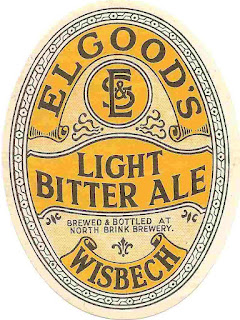Which is exactly what we have here. The recipe is very simple: lager malt, flaked rice and a tiny bit of malt extract. I assume that rice has been chosen as the adjunct in order to keep the colour as pale as possible. There’s really not a lot more to say about the grist.
In reality, this is a Golden Ale, just artificially carbonated, stuck into kegs and served cold.
A typical underlet mashing process was employed. Nothing even vaguely resembling a decoction mash. Though much the same as the scheme used for their other beers.
There was a single type of English hop from the 1973 harvest.
| 1975 Elgood Lager | ||
| lager malt | 6.50 lb | 87.60% |
| flaked rice | 0.67 lb | 9.03% |
| malt extract | 0.25 lb | 3.37% |
| Fuggles 95 min | 0.50 oz | |
| Fuggles 60 min | 0.50 oz | |
| Fuggles 30 min | 0.50 oz | |
| OG | 1034 | |
| FG | 1008 | |
| ABV | 3.44 | |
| Apparent attenuation | 76.47% | |
| IBU | 20 | |
| SRM | 2.5 | |
| Mash at | 151º F | |
| Sparge at | 170º F | |
| Boil time | 95 minutes | |
| pitching temp | 59º F | |
| Yeast | WLP007 Dry English Ale | |
| action | barrels | strike heat | initial heat | mins stood |
| mash | 16 | 147º F | 144º F | 20 |
| underlet | 3 | 200º F | 151º F | 100 |
| sparge 1 | 20 | 170º F | ||
| sparge 2 | 15 | 160º F |

Fascinating that golden ale was created in the 1970’s out of desperation by small and medium sized breweries in Britain.
ReplyDeleteOscar
Do the brewing records indicate if it was kept at the pitching temp, or was it allowed to rise during fermenting?
ReplyDeleteI hadn't really thought of it in those terms. You tend to think of golden ales, at least the cask ones, as beginning in the late eighties with Summer Lightning, although of course there were very pale bitters, especially in Manchester, and beers advertised as being a golden ale long before that.
ReplyDeleteThe old Smithwick’s golden coloured bitter of yore as well.
DeleteOscar
Golden ale as such had always been brewed , it just was not called this. Ales have long been available in all different hues , Boddington's for example was very pale.
ReplyDeletePale Ale is so called because it is brewed using Pale Malt , not because of the beer colour. Black Pale Ale was brewed in the 1870s.